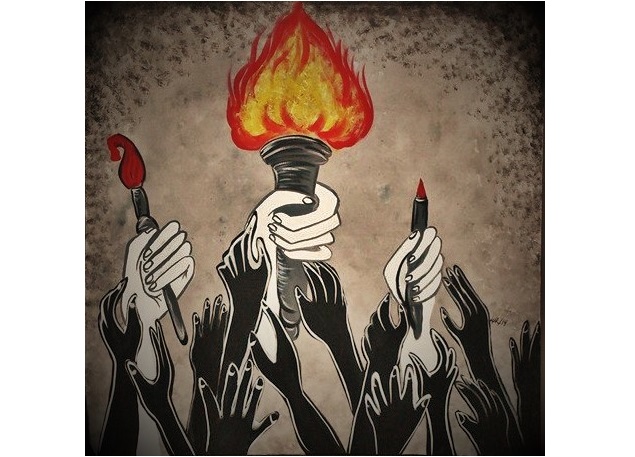Illustration: Keera Ratnam
As US Secretary of State Mike Pomepo lands in Colombo today, close attention will be paid to his meetings at Temple Trees, where he will meet with Sri Lanka’s war crimes-accused president and prime minister. The Sri Lankan government will no doubt spin this as an US attempt to court the regime in Colombo or even as international applause for how the Rajapaksa siblings have ruled since they returned to power. The Secretary of State must make clear that this is far from the case. Sri Lanka’s slide into authoritarianism, the entrenchment of Sinhala chauvinism and its continued disregard for human rights is not a cause for celebration. Instead, the US must deliver a firm and clear message about the path of instability that lays ahead for Sri Lanka, unless drastic reform is made. And in doing so, the Secretary of State must also choose the path that Washington will pursue when dealing with the Rajapaksas.
Less than a year into Gotabaya Rajapaksa’s presidency, the island’s descent into authoritarianism has been practically cemented. As Freedom House highlighted this month, the global coronavirus pandemic has been utilised as a further excuse to consolidate the regime’s stranglehold on the state. The passing of the 20th Amendment just last week, now leaves the executive presidency with even fewer checks and balances than ever before.
The Rajapaksas have also become slicker in how they deploy state power. Though there is no current use of the widespread white van abductions that plagued their previous tenure or even the large scale massacres of 2009 that the siblings oversaw, for many Tamils, especially those still searching for justice, the memories of that are still raw and serve as enough of a reminder of the brutality of the regime. Instead, this time around, the regime has been more bureaucratic and systematic in how it operates. There are no mass detentions or round-ups, but instead, there is a steady flow of arrests throughout the North-East and silencing of dissent across the island. There are no sudden large scale troop deployments, but the constant ramping up of checkpoints throughout the Tamil homeland. All whilst democratic institutions of the state are being swallowed up. Sri Lanka has progressed into a highly militarised, authoritarian and ethnocratic state.
The Rajapaksa rhetoric, however, remains just as brash. Gotabaya, in particular, was never one to mince words - as his track record makes clear. He has been forthright in paying tribute to Sinhala Buddhism and made his militaristic intentions clear, a sentiment that is echoed throughout his party’s senior leadership. Indeed, it was telling that just days before Pompeo’s visit, Sri Lankan officials seemed bold enough to tell the press that it was “not for outsiders to tell Sri Lankans how to run their country”. With Gotabaya’s history of ill-tempered meetings, the outcomes of this one will be closely watched.
Pompeo’s whirlwind trip to Sri Lanka comes at a crucial time for both governments. Over the past year, under the banner of building co-operation with the regime, the US has sent out mixed messages and engaged in seemingly contradictory displays of ‘friendship’. Whilst, on one hand, Pompeo's office announced the barring of Shavendra Silva from the US due to his involvement in war crimes, American officials in Colombo meet with other accused war criminals. Ahead of US elections, Pompeo’s messaging will therefore be crucial. For many, even posing for photographs with the war crimes accused Gotabaya Rajapaksa, when other world leaders have refused to shake his hand, will be seen as a betrayal to America’s own talk of commitments towards finding, justice, accountability and peace on the island. The failure to follow that up with decisive action on those issues will be seen as duplicitous. A US State Department official said last week that Colombo is “at a point to make some choices about where they head”. So too is the United States.





